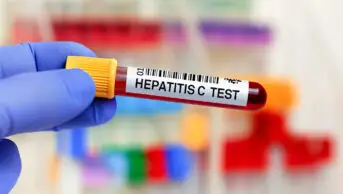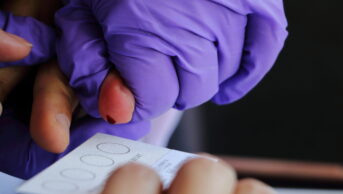
Thomas Deerinck, NCMIR / Science Photo Library
A highly effective therapy for patients with hepatitis C is being launched by AbbVie in the EU over the next couple of months in direct competition with another treatment made by Gilead that was approved in 2014 and is now being rolled out.
On 16 January 2015, the European Medicines Agency (EMA) approved AbbVie’s Viekirax together with Exviera for the treatment of hepatitis C genotype 1 with or without ribavirin and licensed Viekirax with ribavirin for genotype 4 HCV.
Viekirax is a combination tablet consisting of ombitasvir 12.5mg, paritaprevir 75mg and ritonavir 50mg, and Exviera contains dasabuvir 250mg. Two tablets of Viekirax are taken once daily with food and Exviera is taken twice daily. The combination rivals Gilead’s Harvoni, containing sofosbuvir and ledipasvir, which was launched in 2014.
In a phase III trial published in April 2014, a combination of Viekirax and Exviera achieved a cure rate of more than 90% in patients with genotype 1 hepatitis C. Of the 200,000 or so patients with chronic hepatitis C in the UK, genotype 1 accounts for around 46% of cases.
“These new medicines to treat hepatitis C are a major advance,” says Stephen Ryder, consultant hepatologist at Nottingham University Hospitals NHS Trust. They have an excellent evidence base for their use, with cure rates of 97% for genotype 1 patients, and even patients with cirrhosis have similarly excellent outcomes, he says. “The side effect profile is excellent with no major issues identified.”
Charles Gore, chief executive of the Hepatitis C Trust, says the combination of Viekirax and Exviera is an effective therapy. “It is interferon-free, so it is right up there with the combination of sofosbuvir and ledipasvir [Gilead’s Harvoni],” he says. “Interferon is associated with unpleasant side effects leading many patients to not finish their course, so interferon-free treatments present a significant advantage for them.”
Gore says competition between AbbVie and Gilead is fierce. “We could see prices come down because of this,” he says. Historically it has not been the practice of pharmaceutical companies to lower their prices due to competition, but he says there is such a demand for prices to be lowered in this case that it could happen.
In the United States, AbbVie has done an exclusive deal with Express Scripts, the largest ‘pharmacy benefits manager’, and it has stopped reimbursing Gilead’s Harvoni. Gilead has responded by doing its own exclusive deal with CVS Health.
On 16 January 2015, the UK’s National Institute for Health and Care Excellence (NICE) issued final draft guidance recommending both sofosbuvir and simeprevir. NICE is expected to issue final guidance at the beginning of February 2015.
However, in an “extremely unusual” move, NICE has been asked by NHS England to delay implementation of the guidance on sofosbuvir until the end of July 2015, explains Gore. Ordinarily, NHS organisations have three months to implement NICE guidance, not six.
Gore says that because of the cost of the medicines — around £30,000 for 12 weeks of treatment — combined with their highly effective nature, there has never been such a divergence between cost-effectiveness and affordability. “These drugs are definitely cost effective because they are essentially providing a cure, but there are 200,000 people who need treatment and it would bankrupt the NHS to pay for these medicines all at once,” he says.
“NHS England wants the drug companies to battle it out over the price and at the same time they are trying to negotiate them down,” he adds.
Ryder says the cost of the drugs is considerable, but given the high cure rates this seems a price worth paying.
The past 12 months has seen a raft of new medicines launched for the treatment of hepatitis C, all with high cure rates. “We are rapidly approaching the stage where hepatitis C can be effectively eradicated from the UK population with these first rate new therapies,” says Ryder.
- This article was amended on 27 January 2015 to correct an error in the licensing and dosing information for Viekirax and Exviera.
You may also be interested in

Genomics surveillance programme for hepatitis C launched by UK Health Security Agency

How we treated more than 100 hepatitis C patients at pharmacist-led clinics in North Wales
